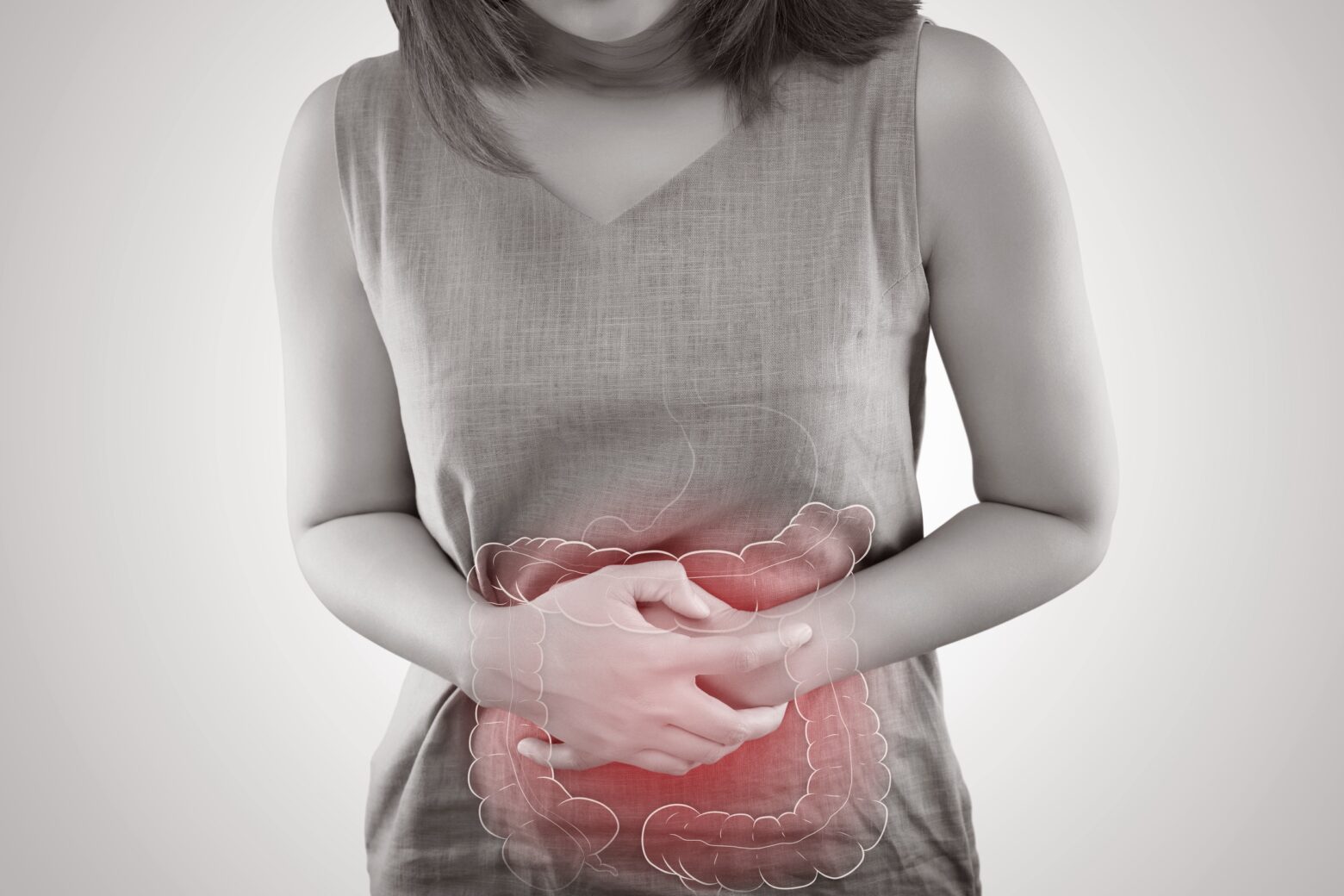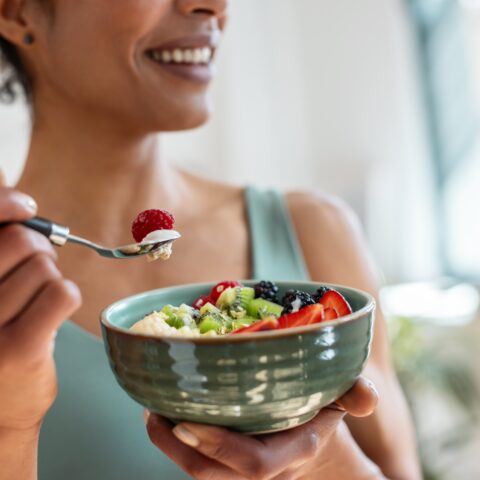What To Do If You Have Ulcerative Colitis

Inflammatory bowel disease is on the rise, with about one in every 117 people suffering from some form of it.
In a recent article, we took a deep scientific dive into inflammatory bowel disorders. Science writer Raphael Sortoli explored common medications and discussed how they can help to avoid surgery.
This lifestyle article will focus specifically on the medications and dietary changes that can help ease ulcerative colitis (UC), which is a type of inflammatory bowel disease.
Let’s start with diving into what exactly UC is, and how to know if you have it.
What Is Ulcerative Colitis?
Ulcerative colitis is a type of inflammatory disorder that damages the colon, a part of the large intestine. Your large intestine is the essential last step of the digestive process. While most think that it only works to eliminate waste, the good bacteria in this part of the gut help to synthesize vitamin K—an essential nutrient for proper blood clotting—and B vitamins, which are necessary for neurological and cellular health.
UC results in pockets of sores that develop like a patchwork across the inner lining of the colon, making it hard for your body to absorb certain nutrients, like vitamin K and B vitamins. As a result, it’s not uncommon to have nutrient deficiencies when you have UC.
Generally, UC develops slowly over time, although people who suffer from it may experience periods where symptoms appear to worsen dramatically over a few months or a year.
Who Is at Risk?
You can get UC at any age, but it is most commonly diagnosed in adolescents and adults under 30.
The Mayo Clinic considers age, ethnicity, and family history to be the three biggest risk factors for UC. Certain ethnicities, like being Ashkenazi Jewish or White, appear to have the highest risk.
While genetics are partially responsible for where in the small or large intestine IBD develops, it does not seem to be a trigger on its own for the disease. [1]
Symptoms of Ulcerative Colitis
UC tends to be remitting and relapsing. There can be flares where the symptoms are intense, and times of remission where it seems to not be present at all.
There are several symptoms to look out for. Most of these symptoms won’t appear at the same time and may come on so slowly that they seem “normal” for the person in question.
Symptoms of UC can include: [2, 3]
- Diarrhea
- Abdominal pain and cramps
- Bowel urgency
- Rectal pain and/or bleeding
- Weight loss
- Fatigue
- Fever
These symptoms are shared by many conditions so its impossible to diagnose yourself with UC. If you experience many of these symptoms, it’s important to see your doctor and get checked out.
If blood appears in your stool or unintentional weight loss occurs, especially in children, seek medical advice immediately.
Three Ways to Treat Ulcerative Colitis
If you or your child have been diagnosed with UC, it can feel overwhelming. Research is still ongoing to understand the specific reason why the disease affects some and not others. Treatment tends to utilize a few key approaches, often determined by how severe the case and symptoms are.
1. Change Your Diet
Diet often plays a big role for patients in managing symptoms, as well as providing some level of control over the healing process.
There is no one specific diet that helps alleviate the symptoms of UC, though going Paleo will likely help. Research finds that avoiding specific types of carbs, gluten, and dairy are useful in managing IBD. [4, 5]
To take it one step further, many patients follow specific dietary protocols, like the Specific Carbohydrate Diet, the Low FODMAP Diet, or the AIP (Autoimmune Protocol), which is a modified version of The Paleo Diet®.
You’ll want to focus on getting plenty of healthy fats and proteins, especially from animal products. These proteins are rich in amino acids that the body needs to rebuild tissue.
Also, consider working with a nutrition professional to determine your specific dietary needs, especially if the UC patient is a child.
2. Supplement with Nutrients
While research is limited on how specific supplements may impact UC, a few nutrients show up frequently in studies: vitamin D, probiotics, and B vitamins.
Vitamin D plays an important role in how the immune system functions. The gut also contains vitamin D receptors. When gut health and immunity are already compromised, vitamin D status could be at risk. Low levels of vitamin D have been tied to relapses of IBD, poor response to medication treatment, and a decreased quality of life in patients who have UC. [6]
Some brands of probiotics have also been studied for UC, such as VSL#3. The results are promising and can, in some cases, be considered an alternative therapy. [7] A problem with VSL#3 is that one inactive ingredient is cornstarch, which can be a digestive irritant.
B vitamins are also a concern, particularly folate. While research does not link an explicit cause between UC and folate or B12 deficiency, when gut health is compromised in any way, absorption of these nutrients may be decreased. Supplementing with folate and B12 could prevent deficiency and support other areas of health (or other potential problems). [8]
However, supplementing with folate has issues. First, the supplemental form is folic acid, which does not exist in nature and has been linked to health concerns. We still recommend getting folate through natural sources such as broccoli and leafy green vegetables.
3. Take Medication
Gastroenterologists treat IBD with certain medications aimed at reducing inflammation levels, decreasing the chance of infection, and modulating the immune system’s role in furthering the damage.
However, many of these pharmaceutical interventions have significant side effects and don’t control all of the symptoms. You should follow the advice of your doctor, but we recommend including a healthy diet as part of that treatment.
The Bottom Line
Ulcerative colitis is an inflammatory disease that impacts the large intestine. The symptoms may take years to develop, and the disease may seem to come and go. Dietary changes can play a significant role in managing the disease and improving the quality of life in patients.
References
1. Cleynen, I., Boucher, G., Jostins, L., Schumm, L. P., Zeissig, S., Ahmad, T., Andersen, V., Andrews, J. M., Annese, V., Brand, S., Brant, S. R., Cho, J. H., Daly, M. J., Dubinsky, M., Duerr, R. H., Ferguson, L. R., Franke, A., Gearry, R. B., Goyette, P., Hakonarson, H., … Lees, C. W. (2016). Inherited determinants of Crohn’s disease and ulcerative colitis phenotypes: a genetic association study. Lancet (London, England), 387(10014), 156–167. https://doi.org/10.1016/S0140-…
2. Lynch, WD, Hsu, R. (2020). Ulcerative Colitis. https://www.ncbi.nlm.nih.gov/b…
3. Ungaro, R., Mehandru, S., Allen, P. B., Peyrin-Biroulet, L., & Colombel, J. F. (2017). Ulcerative colitis. Lancet (London, England), 389(10080), 1756–1770. https://doi.org/10.1016/S0140-…
4. Knight-Sepulveda, K., Kais, S., Santaolalla, R., & Abreu, M. T. (2015). Diet and Inflammatory Bowel Disease. Gastroenterology & hepatology, 11(8), 511–520. https://www.ncbi.nlm.nih.gov/p…
5. Zhan, Y. L., Zhan, Y. A., & Dai, S. X. (2018). Is a low FODMAP diet beneficial for patients with inflammatory bowel disease? A meta-analysis and systematic review. Clinical nutrition (Edinburgh, Scotland), 37(1), 123–129. https://doi.org/10.1016/j.clnu…
6. Leskovar, D., Meštrović, T., Barešić, A., Kraljević, I., Panek, M., Čipčić Paljetak, H., Perić, M., Matijašić, M., Rogić, D., Barišić, A., Ljubas Kelečić, D., Vranešić Bender, D., Krznarić, Ž., & Verbanac, D. (2018). The Role of Vitamin D in Inflammatory Bowel Disease – Assessing Therapeutic and Preventive Potential of Supplementation and Food Fortification. Food technology and biotechnology, 56(4), 455–463. https://doi.org/10.17113/ftb.5…
7. Jia, K., Tong, X., Wang, R., & Song, X. (2018). The clinical effects of probiotics for inflammatory bowel disease: A meta-analysis. Medicine, 97(51), e13792. https://doi.org/10.1097/MD.000…
8. Pan, Y., Liu, Y., Guo, H., Jabir, M. S., Liu, X., Cui, W., & Li, D. (2017). Associations between Folate and Vitamin B12 Levels and Inflammatory Bowel Disease: A Meta-Analysis. Nutrients, 9(4), 382. https://doi.org/10.3390/nu9040…
Aimee McNew
Aimee McNew is a nutritionist and writer who focuses on women’s health, infertility, and postpartum wellness.
More About The Author



